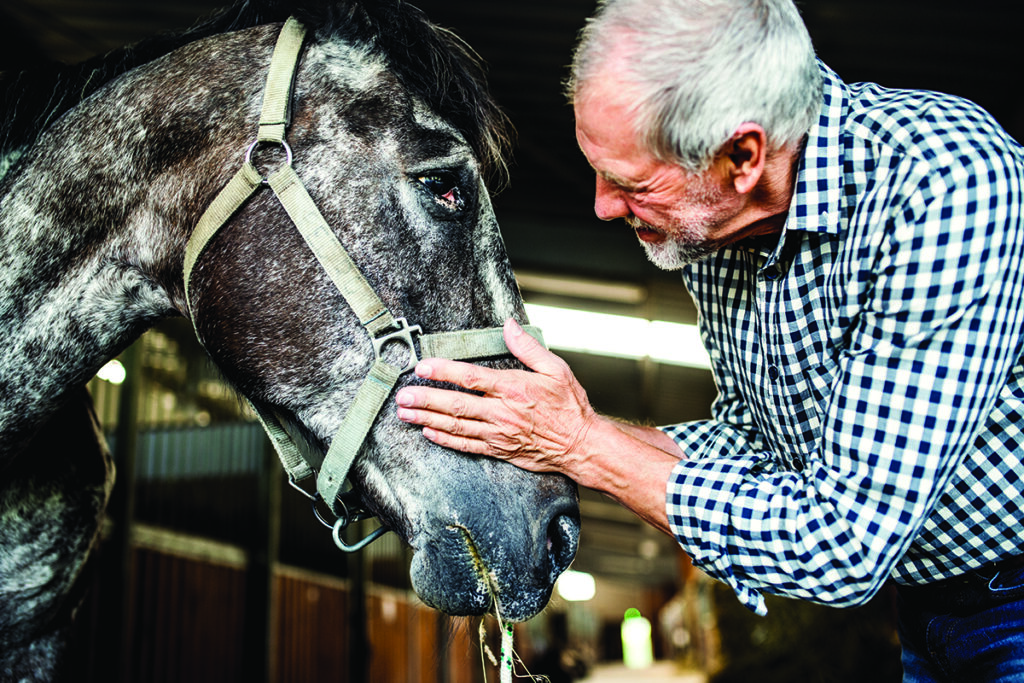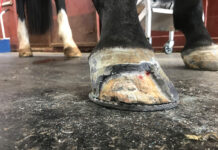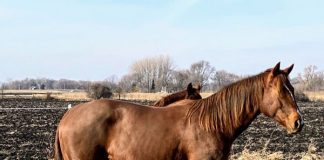
The elderly gray Appaloosa craned her neck to watch me as I gently ran my hand over the hard swelling on her hind leg. I didn’t like the fact that the large mass was right on the outside of the stifle joint. I also didn’t like the fact that the swelling had been present for over a month, and Gregg had just now asked me to come see it.
“Nope, seems fine,” replied the man holding Ellen’s lead rope. “But she does favor it.”
Now in my world, when a horse favors a leg it means that the leg hurts and that the horse is limping, which technically means that the horse is lame. For reasons I don’t understand, the word “lame” seems to reliably cause horse owners to become defensive, so I’ve learned to settle for the term “favoring it.”
Looking for Answers
I asked Gregg if he’d jog Ellen for me. She was lame at the trot but took an almost normal stride at the walk.
I palpated the stifle joint more carefully. All external ligaments were intact, but I couldn’t feel the lateral aspect of the joint because of the large amount of swelling. If it was an infection and affected part of the stifle joint, Ellen could be in big trouble.
I sedated her lightly and scrubbed the area with a chlorhexidine-based surgical soap. Gregg blanched as I held up a large bore needle.
“What are you going to do with that, Doc? Needles give me the spins!”
“You don’t have to watch, Gregg,” I said. “I’m going to try to tap into this swelling and see what is in there.”
Gregg visibly paled, turned his back to me and started humming loudly, and I leaned forward and popped the thick needle straight into the center of the mass on the mare’s leg. I gave the needle a quick twist with my fingers, and suddenly there was a rush of yellowish fluid, some of which hung from the needle hub like mucus.
I quickly caught some of it in a test tube, then connected a large syringe to the needle and proceeded to suck out almost 170 ml of the same cloudy, syrupy fluid. Not knowing exactly what I was trying to treat, I injected a Hail Mary dose of a steroid back into the area and pulled the big needle out.
It was either a seroma, which is basically the aftermath of blood leaking under the skin after trauma of some sort, or an infected joint. I knew I would be euthanizing Ellen if it were the latter, as a month-old infected joint basically had a hopeless prognosis.
Steroids are contraindicated when infection is present, but they would at least help make the pony more comfortable until I had a diagnosis.
Gregg was still humming loudly, and I announced that he could turn around. He braved a glance in my direction but blanched as I held up the full syringe triumphantly. The mare’s leg was considerably deflated, and I started her on some medicine and went home to analyze the fluid.
Mystery Solved
Gregg called as I was about halfway home.
“What did you find out, Dr. Diehl?”
“My fuel mileage is terrible.” I replied. “Oh, and it looks like it might rain.”
“No, about Ellen!”
I sighed. “Gregg, I’m not even home yet! I promise I will call you immediately when I know something.”
Since I was no clinical pathology expert, the odds of me having to send the fluid out for analysis were fairly high, but I gave it my best shot. I made several thin smears of the fluid on a microscope slide, air dried them, then used a special stain that would highlight things like white blood cells and bacteria. I couldn’t find many cells in the fluid and could only identify a few pieces of fibrin, a protein that forms when blood clots.
Infection seemed less likely, but I couldn’t risk making the wrong call. The fluid was cloudy, and usually seromas produced clear fluid, so I sent the sample off to the lab. Their bacterial culture was negative, and the pathologist just reported the same fibrin on the cytology report, which meant that a seroma was indeed more likely.
I called Gregg back and explained the lab’s findings and got his permission to X-ray the leg. When I looked at the images, there was a lesion on the tibia consistent with a nasty bone bruise, and I knew we’d found the explanation for the angry fluid and the lameness.
Gregg’s eyes were wide as he studied the X-rays.
“I bet old Dobbin did that to her, Doc! He’s a mean one when there’s food around!” He shook a finger at an ancient chestnut gelding that meandered around a corner. “You bad horse! I’ll turn you into glue if you do that again!”
Dobbin reached for the carrot that Gregg had produced, and the man stroked the old gelding’s neck.
Another Horse Favors a Leg
Ellen went on stall rest for another four weeks, and the swelling gradually improved, as did the lameness. Gregg spread the hay piles out further and peace seemed to be restored.
About a month later, Gregg asked me to take a look at Dobbin, who had a swelling on his hind leg and a perfect imprint of a hoof embedded on his rear end, accompanied by some bite marks. Ellen was calmly munching from the nearby hay pile, but when Dobbin dared a glance in her direction, she pinned her ears flat and advanced towards him very slightly.
Gregg chuckled, then pointed at Dobbin. “And it serves you right, Glue!”
He thumped the old horse on the neck affectionately. “Now, what do you make of this leg, Doc? He’s not lame, but he is favoring it.”
This article about what to do when a horse favors a leg originally appeared in the September 2021 issue of Horse Illustrated magazine. Click here to subscribe!





